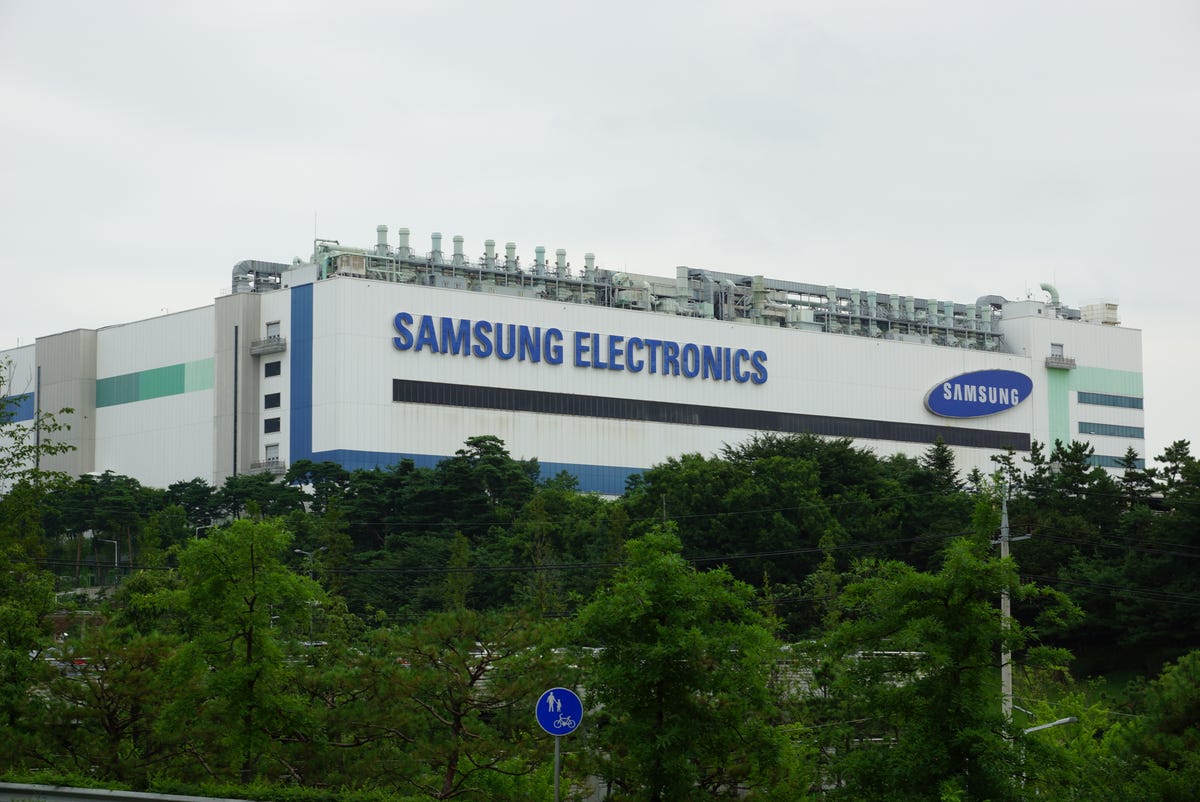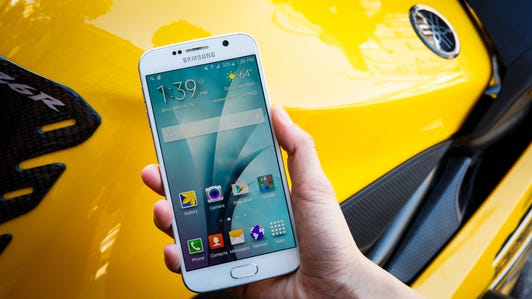
Shara Tibken/CNET
Samsung, the world’s biggest maker of smartphones and TVs, is also dead serious about chips.
So serious that it will spend about $15 billion to open a new semiconductor factory in South Korea by 2017. That’s big bucks even compared with the rest of industry, which spends closer to $10 billion for each new factory.
Samsung is proof that Moore’s Law matters, the idea that processor power improves exponentially every two years. But to keep up the pace of chip innovation, the industry has had to throw a lot of money and a lot of great minds at the problem. So far, it’s paid off for Samsung. The company is the world’s biggest vendor of memory chips and the second biggest processor maker overall after Intel, which was co-founded by Gordon Moore, the man behind Moore’s Law. Chances are you have a Samsung product in your life, even if it’s the flash memory in your favorite tablet.


CNET
Today’s chip-making business is a race to the tiny. The first companies to make next-generation products smaller and faster stand to win more customers — at their rivals’ expense — and to recoup their investments. The also-rans? Not so much.
“It’s very important for us to be first,” said Kelvin Low, senior director of foundry marketing for Samsung’s semiconductor business. “These days, second and third becomes extremely challenging … because from that point on, securing market share is difficult.”
Being first is so important, in fact, that Samsung skipped a step in the manufacturing process to get to more advanced chip technology before most of its rivals. Instead of having to learn one new technique, it’s implementing at least three at once. That, though, can lead to problems like poor yields.
So far, the risk is paying off. Samsung is attracting new customers, which will give it a bigger slice of the foundry market — manufacturers hired to build chips designed by so-called “fabless companies” like Qualcomm and Nvidia. Analysts believe Samsung’s chip manufacturing business has won back Apple as a customer for the next iPhone processor, giving it both revenue and prestige. Apple buys more chips than any other company on the planet except Samsung, but the Korean company lost Apple’s business last year because of ongoing legal fights over phone and tablet designs.
One misstep or delay, though, and all of Samsung’s newly won customers might defect to other processor manufacturers.
Keeping up with Moore
In 1965, Intel’s Moore noted that chips would double in complexity at a rapid, regular rate — initially he thought every year, but later revised that to every two years — as the building blocks of the processor got smaller and were more tightly packed together. That made devices faster, cheaper and more power efficient. His observation, dubbed Moore’s Law, has been true for the past 50 years.
But it’s become massively expensive for chipmakers to keep up.
MOORE’S LAW 50TH ANNIVERSARY
- Inside the multibillion-dollar quest to make faster, cheaper gadgets
- Moore’s Law is the reason your iPhone is so thin and cheap
- Visiting the places that make Moore’s Law happen (pictures)
- Adios, silicon: Why exotic designs are the future for the chips in your gadgets
Moving to each new generation of processor technology takes years of development and billions of dollars in research, equipment and construction costs. Building a new semiconductor factory can cost upwards of $10 billion, limiting the companies willing and able to play at the leading edge of chip technology. It’s also become exponentially more expensive for fabless chip companies to design advanced processors, which means those that don’t need the most-advanced technologies for things like high-end smartphones and data centers will be slower to adopt the newer chips.
It’s now largely up to four manufacturers to keep Moore’s Law going — Intel, Samsung, Taiwan Semiconductor Manufacturing Co. (TSMC) and Globalfoundries. If those companies don’t keep advancing, the smartphones we use will stop getting smarter, and the battery life of those devices will never stretch past a day or two.
Innovation could simply stall.
Chip manufacturing is a big business. Last year, foundries made $46.85 billion in sales, up 16 percent from 2013, according to Gartner. TSMC led the group with more than half of all market share. Samsung, by comparison, ranked No. 4 with 5.1 percent share (though the figure didn’t take into account the chips the company builds for itself for use in its smartphones and tablets).
Samsung is in a unique position in the chip market. It not only designs and manufactures semiconductors for its own electronics but also builds processors for other companies — most notably, smartphone rival Apple. TSMC solely manufactures processors designed by others. Globalfoundries licenses Samsung’s technology to build advanced processors for other companies. While Intel has dabbled in the foundry market — building chips for a few small companies it doesn’t compete against — it dedicates the bulk of its manufacturing capacity for its own processors.
Second place = first loser
Being first with new technology doesn’t just bring bragging rights. It attracts more customers and fills a manufacturer’s factories — helping it make more money that it can then invest in even more factories. If a chip manufacturer doesn’t have a factory running at capacity, it doesn’t make back the money it invested to build the facility in the first place.
Samsung surprised the industry when it started producing what’s currently the most advanced technology — known as 14 nanometers, or billionths of a meter, in reference to the size of part of a transistor — ahead of TSMC by several months. TSMC said it plans to move to the newer technology later this year, but being even six months behind has put it at a disadvantage when it comes to attracting customers.
TSMC didn’t respond to a request for comment, but the company on Thursday projected lower revenue in its current quarter in part because of tougher competition in the chip market.

 Enlarge Image
Enlarge ImageShara Tibken/CNET
“In the last two decades … the most bleeding-edge technology [aside from Intel] was all developed by TSMC and its foundry service,” said Gartner analyst Samuel Tuan Wang. “Now Samsung, for the first time in history, is beating the schedule of TSMC in process technology by almost two quarters.”
Samsung also hit that milestone about six months after Intel — instead of lagging its US rival by years. But Intel, while currently selling many 14-nanometer PC chips, has been slower to apply the technology to its mobile processors. Since more smartphone chips are sold than PC chips, Intel has been missing out on the faster-growing market. Samsung’s Galaxy S6, which will likely be the Korean company’s top-selling smartphone this year, is the first product to use Samsung’s 14-nanometer chips.
How did Samsung beat TSMC? It decided to skip over 20 nanometers, the technology that’s currently used by TSMC to build Apple’s A8 and A8X iPhone chips and iPad processors. Instead, Samsung turned its attention and R&D investment to 14 nanometers.
“It was not an overnight thing … [and] it’s not magic,” Low said. “We basically put more focus on 14 nanometers, while some other foundries chose to put [their] focus on 20 or 22.”
Visiting the places that make Moore’s Law happen (pictures)






Even if Samsung has the best technology among the foundries (not including Intel), there are risks to relying on the company as a chip manufacturer. Samsung often talks about a sort of Chinese wall between its electronics business and its chip operations, which means that the chip side of Samsung keeps confidential the products that other consumer electronics makers are building that require its processors. But it can be tricky working with a fierce rival, and it’s hard to imagine Samsung spurning business from its biggest customer (itself) to meet demand for its other customers first.
For now, the question is whether Samsung can cement its momentary lead over TSMC and even catch up to Intel. Intel, for one, won’t be ceding its longstanding manufacturing leadership without a fight, saying it doesn’t believe any rivals will pass it when it comes to advanced chip technologies.
“I don’t think that’s likely, time-wise or feature-wise,” Mark Bohr, an Intel senior researcher who heads a team developing the company’s future chips, said when asked how likely it is that Samsung and TSMC will catch up.
Samsung in front
Still, Samsung is signing up new customers, both for its older 28-nanometer technology and its new 14 nanometers. Nvidia, one of the world’s biggest graphics chipmakers, revealed in a regulatory filing last month that it added Samsung as a manufacturing partner. A year earlier, it relied mostly on TSMC.
Nvidia declined to provide information about which of its chips will be built by Samsung but said in a statement that TSMC “is and will remain a very important foundry partner for us.”
Qualcomm, the world’s biggest provider of the 3G and 4G LTE chips used to provide wireless service in mobile devices, also is expected to turn to Samsung for its upcoming Snapdragon mobile processors.

 Enlarge Image
Enlarge ImageShara Tibken/CNET
Qualcomm declined to comment.
And then there’s Apple.
Samsung’s foundry business took a hit last year when Apple turned to TSMC. The two companies had worked together for years to build chips for iPhones and iPads, but that was before Apple and Samsung faced off in high-profile patent-infringement suits.
The loss of Apple’s chip business was a blow to Samsung’s reputation and financial results. Gartner estimates Samsung generated $2.7 billion in sales from building Apple’s chips last year, down from $4.3 billion in 2013 when it was Apple’s primary manufacturer.
Market watchers believe, however, that Apple will return to Samsung for the production of at least some of the 14-nanometer A9 chips it’s expected to use in the next iPhone, which is rumored for release later this year.
“Samsung is likely to take substantial share of [the] Apple A9 foundry business,” Jefferies analysts noted last month.
Apple declined to comment. Samsung also declined to talk about customers beyond saying its customer list “is growing.”
TSMC won’t be going away either. Its foundry business is 10 times the size of Samsung’s, and it doesn’t have any of the tricky “frenemy” issues chip designers find with Samsung.
Other companies uncomfortable with partnering with a rival can work with Globalfoundries instead. Now owned by the investment arm of the government of Abu Dhabi, Globalfoundries works closely with Samsung and licenses the Korean company’s technology for 14 nanometers. Analysts believe Apple, Qualcomm and others will rely on Globalfoundries as a second source for Samsung’s manufacturing techniques, which also helps mitigate competitive risks and supply shortages.
The race continues
While Samsung’s chip fortunes may be on the upswing, that could all change tomorrow. In the new manufacturing race, no one can risk slowing down.
Some experts predict that Intel, TSMC and Samsung will be neck-and-neck in delivering the next generation of technology, 10 nanometers. If Samsung and TSMC catch up with Intel, said Dan Hutcheson, CEO of chip-manufacturing research firm VLSI Research, it would weaken Intel’s edge and make it even harder for the Santa Clara, Calif., company to break into mobile. And if TSMC beats Samsung to the technology, it could regain all the customers it has lost.
It’s like a giant hamster wheel, with billions of dollars at stake.
“If you want to win the market, you cannot stop,” Gartner’s Wang said. “Once you stop, you fall behind, and that’s the end of the game.”
Ben Fox Rubin contributed to this report.
Fully metal Samsung Galaxy S6 looks sharp (pictures)










